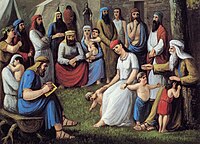Mulek
This article uses texts from within a religion or faith system without referring to secondary sources that critically analyze them. (April 2024) |
| Part of a series on |
| People in the Book of Mormon |
|---|
 |
Mulek (/ˈmjuːlɛk/),[1] according to the Book of Mormon, was the only surviving son of Zedekiah, the last King of Judah, after the Babylonian conquest of Jerusalem. The Book of Mormon states that after escaping from Judah, Mulek traveled to the Americas and established a civilization there.
The word Mulekite, after Mulek, is commonly used to refer to his group. It is one of four groups (the others being the Nephites, the Lamanites, and the Jaredites) described in the Book of Mormon as having settled in the ancient Americas, although the name Mulekites does not appear in the Book of Mormon itself. Archaeological evidence for the existence of any of these groups has not been documented.[2]
Mulek and his nation
[edit]According to the Book of Mormon, when Jerusalem was destroyed by Babylon, during the reign of Zedekiah, all of the sons of Zedekiah were killed except Mulek.[3][4] Along with "as many as would hearken unto the voice of the Lord," Mulek escaped into the wilderness, traveled "across the great waters" to the Americas, and founded a new nation.[5] The people of Mulek established their capital at Zarahemla, north of where Lehi and his people landed.[6]
Encounter with Jaredites
[edit]The last surviving Jaredite, Coriantumr, encountered the Mulekites, who he lived with for several months before he died.[7]
Encounter with Nephites
[edit]When the Nephites were commanded to leave their historic homeland of Lehi-Nephi to flee from the Lamanites, the exiled remnants discovered the city of Zarahemla, to their north. The Book of Mormon records that the Mulekites spoke a language that was largely unintelligible to the Nephites. When taught the Nephite language, the Mulekites recounted their descent from Mulek, which was then recorded.
The Mulekites had in their possession a stone that told the story of Coriantumr, a survivor of the Jaredites who had encountered the Mulekites and lived among them until his death. Much of the prior Mulekite history was lost because of their lack of records.[8]
References
[edit]- ^ "Book of Mormon Pronunciation Guide", IPA-ified from «myū´lĕk»
- ^ Terryl L. Givens, By the Hand of Mormon: The American Scripture that Launched a New World Religion (New York: Oxford University Press, 2002), pp. 146-147.
- ^ Helaman 8:21
- ^ Omni 1:15
- ^ Omni 1:16
- ^ Helaman 6:10
- ^ "Omni 1:20-22". www.churchofjesuschrist.org. Retrieved 2024-11-16.
- ^ Omni 1:17


 French
French Deutsch
Deutsch